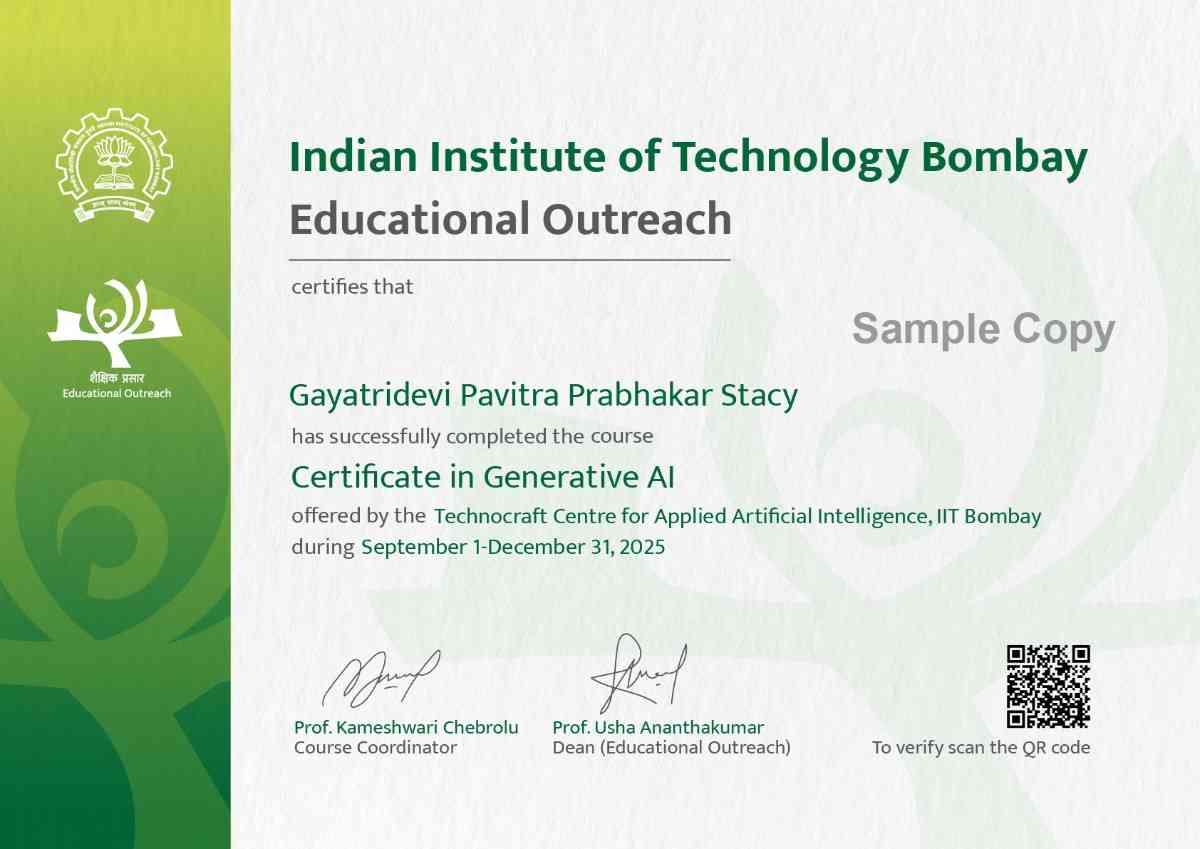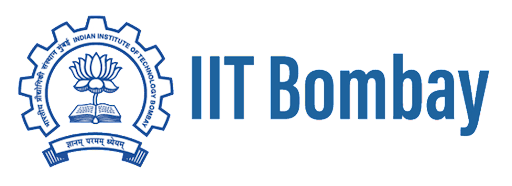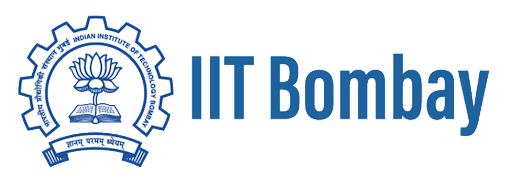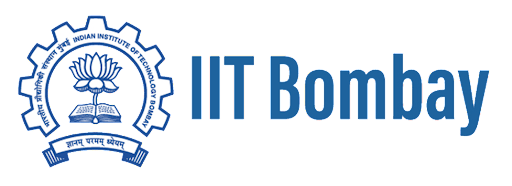Learn more about the course
Get details on syllabus, projects, tools, and more

Certificate in Generative AI
Application closes 5th Mar 2026
Key Course Outcomes
Master practical Generative AI skills
Become a hands-on GenAI builder with prompts, RAG, tuning, agents, and LLMOps.
-
Design reliable LLM features and workflows
-
Adapt foundation models to enterprise data using Retrieval-Augmented Generation (RAG)
-
Build agentic applications that call tools, use memory, and follow workflows for business use-cases
-
Deploy and operate Generative AI systems using LLMOps practices
Earn a Certificate of Completion from IIT Bombay
Key Course Highlights
Why choose the Certificate in Generative AI
-

IIT Bombay Faculty-led
Learn from experienced IIT Bombay faculty through live sessions, hand-on work, and structured feedback
-

Real-world projects
Curriculum and projects focussed on building, adapting, and operating real GenAI features.
-

Weekly Live Sessions
Interactive classes, query resolution and practice to keep you on track
-

Agentic & RAG tool stack
Gain mastery in LangChain, LangGraph, and other cutting-edge GenAI tools
-

Operational focus with LLMOps
Package, deploy, and monitor GenAI apps with CI/CD basics; and security, privacy and governance controls
-

Dedicated learner support
Receive personalized assistance from a dedicated programme manager throughout your learning journey
Skills you will learn
Prompt engineering
Retrieval-Augmented Generation (RAG)
LLMOps
Agentic AI
LLM evaluation & guardrails
Lightweight fine-tuning
Transformer & LLM fundamentals
Python for Generative AI
Embeddings & vector databases
Classification and summarization
Model selection
Data preparation & labeling for LLMs
CI/CD for LLM applications
Prompt engineering
Retrieval-Augmented Generation (RAG)
LLMOps
Agentic AI
LLM evaluation & guardrails
Lightweight fine-tuning
Transformer & LLM fundamentals
Python for Generative AI
Embeddings & vector databases
Classification and summarization
Model selection
Data preparation & labeling for LLMs
CI/CD for LLM applications
view more
- Overview
- Learning Journey
- Curriculum
- Tools
- Certificate
- Faculty
- Fees

This course is ideal for
This hands-on GenAI certificate is ideal for builders and tech leads seeking practical skills.
-
Software and Technology Professionals
who want to add GenAI features to products, stay current with new tools, and unlock career opportunities in software and AI
-
Data Scientists and Data Analysts
looking to move beyond prediction into text, image, and code generation to automate reports and extract more value from data
-
Tech Consultants and Managers
seeking to evaluate GenAI options, lead cross-functional builds, manage risks, and present ROI cases to clients and stakeholders
-
Product Managers and Product Owners
aiming to embed Generative AI into product features and workflows to boost user value and accelerate delivery
-
Business Analysts and Consultants
who want to use Generative AI to surface deeper insights and streamline decision-making
-
STEM/Engineering Graduates
Hands-on training that positions them at the forefront of an emerging, high-growth industry
Experience a unique learning journey
Live teaching, Q&A, and hands-on work help you build practical skills and momentum each week.
-
Weekly live sessions
Interactive classes for concept clarity, hands-on and Q&A with IIT Bombay faculty.
-
Peer-to-Peer Learning
Learn with a cohort - discuss and share ideas in class and in discussion forums.
-
Industry-Relevant Curriculum
Work on projects - apply concepts & tools to real use cases
-
Get personalized assistance
Our dedicated programme managers will support you whenever you need
Comprehensive Curriculum
Designed by IIT Bombay faculty, this hands-on certificate builds practical Generative-AI skills such as prompting & evaluation, RAG, PEFT/LoRA, agentic systems, and LLMOps. Learners are equipped to design, adapt, deploy, and monitor reliable LLM applications.
-
5 modules
LLM-first approach
-
3–4 hrs/week
live teaching + practice
-
12+ AI tools
Key AI & Agentic AI tools
Module 1: Foundations of Generative AI
This module introduces the conceptual building blocks for working with AI systems. Learners set up Python, familiarise themselves with core machine learning concepts, and understand how data flows through modern pipelines. Short primers on deep learning and NLP (embeddings) establish a shared vocabulary. The module also covers how modern models represent language, why embeddings matter, and how these representations power downstream tasks. By the end, learners can explain how meaning is encoded numerically and why this foundation is essential for LLM applications. Topics Covered: - Python for Generative AI - Advanced Python for Generative AI Applications - Introduction to Machine Learning - Introduction to Deep Learning - NLU and NLP: Word Embeddings
Module 2: Natural Language Processing with Generative AI
This module moves from fundamentals to the core mechanics of modern language models. Learners unpack attention mechanisms and transformer architecture before applying these concepts to practical prompting. The module demonstrates how LLMs handle both classification and labelling tasks, as well as open-ended text generation and summarisation, highlighting what changes, what to measure, and how to steer outputs eectively. Topics Covered: - Attention Mechanism and Transformers - Large Language Models and Prompt Engineering - LLMs for Classification and Text Labelling - LLMs for Text Generation and Summarisation
Module 3: Multimodal AI
In this module, learners will explore the evolution from CNNs and VAEs/GANs to diffusion-based foundation models, and how text pairs with images/audio for real tasks. They will learn multimodal prompting patterns and how to build and evaluate simple multimodal apps. Topics Covered: - Evolution of Multimodal Models - from CNNs to VAEs, GANs, Transformers, and Modern Diffusion-based Foundation Models - Applications: Vision-Language Models, Audio-Visual Reasoning, Robotics, etc. - Multimodal Prompting & Interaction - Building & Evaluating Multimodal Applications
Module 4: Designing LLM Workflows and Applications
This module focusses on designing production-ready workflows that ground models in enterprise data. Topics include Retrieval-Augmented Generation (RAG), application blueprints, and selective fine-tuning for accuracy and tone. The module concludes with clear decision-making guides on when to use RAG, when to fine-tune, and how to evaluate performance. Topics Covered: - Retrieval-Augmented Generation - Advanced RAG: Optimisation and Multi-Modal RAG - Designing and Building LLM Workflows - Fine-Tuning Custom LLMs
Module 5: Designing and Building AI Agents
This module translates single-prompt prototypes into multi-step systems that plan, use tools, and manage tasks collaboratively. Agent capabilities and patterns are introduced first, followed by building single-agent flows with memory and tool integration. The module ends with multi-agent collaboration and principled evaluation to support trust in agent behaviour. Topics Covered: - Introduction to AI Agents - Building Single-Agent Systems and Agentic RAG - Multi-Agent Collaboration and Agent Evaluation
Module 6: Deploying, Securing, and Managing LLM Applications
The final module addresses deploying applications responsibly and ensuring their ongoing reliability. The concepts covered include CI/CD for LLM apps, deployment patterns, and live monitoring for latency, cost, drift, and quality. The module also covers vulnerabilities, data governance, and operational controls so that releases are secure, compliant, and observable from day one. Topics Covered: - CI/CD and DevOps for LLM Applications - LLMOps: Generative AI Application Deployment - LLMOps: LLM Application Performance Monitoring - Mitigating LLM Vulnerabilities and Ensuring Data Governance
Languages and Tools covered
Build hands-on expertise with tools and frameworks used across Generative AI systems
Earn a Certificate of Completion from IIT Bombay
-

Designed by IITB Faculty
The curriculum is designed and delivered by IIT Bombay faculty
-

Gain Mastery in GenAI
Gain mastery in LangChain, LangGraph, and other cutting-edge GenAI tools

* Image for illustration only. Certificate subject to change.
Meet your faculty
Learn from IIT Bombay faculty with deep expertise in GenAI
Course Fees
The course fee is ₹ 1,80,000
Invest in your career
-

Design reliable LLM features and workflows
-

Adapt foundation models to enterprise data using Retrieval-Augmented Generation (RAG)
-

Build agentic applications that call tools, use memory, and follow workflows for business use-cases
-

Deploy and operate Generative AI systems using LLMOps practices
Selection Process
Registrations close once the required number of participants enroll. Apply early to secure your spot.
-

Application
Interested candidates can apply by filling out a simple online application form.
-

Interview Process
Go through a mandatory screening call with the registration office.
-

Offer of Registration
Selected candidates will get an offer letter and must pay the fee to confirm registration.
Eligibility Criteria
- Bachelor’s degree (any discipline) from a recognized university with a minimum aggregate of 50 % (or equivalent CGPA)



 Speak with our expert
Speak with our expert




























